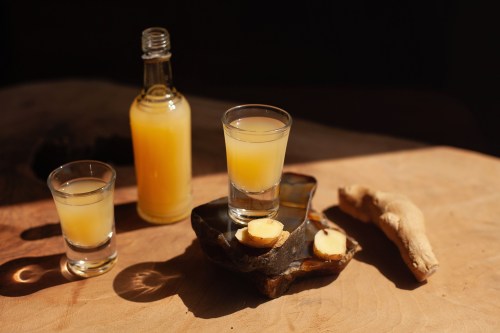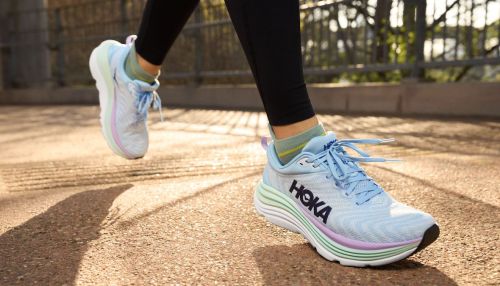Scroll through TikTok or Instagram Reels for long enough and you’re sure to find videos of people singing the praises of taking a ginger shot each morning. The claims? A faster metabolism, a stronger immune system, and better focus and concentration to name a few.
Experts in This Article
non-diet dietitian who specializes in diabetes, insulin resistance, and PCOS
board-certified gastroenterologist at the Gastroenterology Institute of Southern California
But do you have to give up your morning coffee in favor of a ginger shot? We asked a registered dietitian and a gastroenterologist to weigh in on whether these benefits are legit and if morning ginger shots are actually worth the hype.
But first, a breakdown of the ingredients in ginger shots
While ginger is the main ingredient, most ginger shots include other health-boosting ingredients like lemon juice, turmeric, cayenne pepper, or honey, according to Erin Davis, MS, RDN, CDCES, registered dietitian and diabetes specialist. Let’s take a deeper dive into the benefits of all these components:
- Ginger: Gingerol, a natural component of ginger root, improves digestion, provides nausea relief, and contains antioxidants and anti-inflammatory properties that prevent wear and tear on our cells1
- Lemon juice: Lemon juice aids in digestion, regulates blood sugar, prevents kidney stones, and improves skin health skin2,3,4
- Turmeric: Turmeric and its components, like curcumin, may reduce inflammation, boost kidney health, decrease muscle soreness after exercise, and lower your risk of high cholesterol, heart disease, stroke, and type 2 diabetes5
- Cayenne pepper: Capsaicin, a natural component of cayenne pepper, can support weight management and alleviate lower back pain, nerve pain, and pain related to conditions like arthritis and fibromyalgia6
- Honey: The antioxidants in honey may help improve your gut microbiome, regulate blood pressure and blood sugar, and lower your risk of heart disease7,8
7 benefits of ginger shots in the morning
Before we get into the perks of ginger shots, we just want to get one thing out of the way: Ginger shots don’t rid your body of toxins. While you’ve probably seen people on social media claim these shots are great for detoxing, that’s nothing more than a myth, according to our experts.
“The body does not require an external detox program like ginger shots or juice cleanses,” says Peyton Berookim, MD, FACG, a board-certified gastroenterologist at the Gastroenterology Institute of Southern California. “The body has several organs that are responsible for detoxification. The liver, kidneys, digestive system, and skin are naturally designed to eliminate toxins and waste products.”
Now, onto all the ways ginger shots actually do benefit your health. (FYI: Morning may be a good time to take a ginger shot so you don't forget, but there isn't a proven time of day that ginger will work best, per Davis. “So don't get too hung up on the time of day you consume ginger,” she says.)
1. Boost immunity
“Ginger has natural antibacterial and antiviral properties that can help strengthen your immune system, reducing your risk of infections and illnesses,” Dr. Berookim says.
Indeed, ginger contains vitamins and minerals like iron, magnesium, vitamins B6 and C, and zinc, which, along with its antioxidants, can strengthen your immune system.
2. Support better digestion
“Ginger is known for aiding digestion by stimulating the production of digestive enzymes, which can help relieve bloating, indigestion, and gas,” Dr. Berookim explains.
It also promotes the movement of food through your digestive tract, according to Dr. Berookim, and Davis agrees. “Ginger can improve gut bacteria and increase the number of different species of intestinal flora—aka good bacteria—which may lead to better digestion,” she adds.
3. Reduce inflammation
“Ginger contains bioactive compounds like gingerol, which have anti-inflammatory effects,” Dr. Berookim says. “Regular consumption of ginger shots may help reduce inflammation in the body, potentially aiding in conditions like arthritis.”
Research backs this up: Reviews in medical journals like Molecules9 and Food Chemistry Advances10 have found that ginger can reduce inflammation in the body and improve symptoms of health conditions like ulcerative colitis, Crohn’s disease, rheumatoid arthritis, psoriasis, and lupus.
4. Relieve nausea
“Ginger is widely recognized for its ability to alleviate nausea, including motion sickness, morning sickness during pregnancy, and nausea caused by chemotherapy,” Dr. Berookim says.
A review published in Integrative Medicine Insights supports Dr. Berookim's insights and states that 250 milligrams (mg) of ginger root can help reduce the incidence of chemotherapy-induced nausea and vomiting. The same review shows evidence that 1,000 mg of ginger root per day is effective in reducing nausea and vomiting during pregnancy.11
5. Protect against disease
“Ginger is rich in active plant compounds12 that are known antioxidants and help protect against nerve damage, heart disease, cancer, diabetes,” Davis says. A review published in the International Journal of Physiology, Pathophysiology, and Pharmacology also notes that ginger may be able to help prevent tumor formation of some cancers, inflammatory conditions (such as arthritis), liver disease, and migraine.13
6. Regulate blood sugar levels
Supplementing with ginger can improve blood sugar levels, according to Davis. One study published in Iranian Journal of Pharmaceutical Research found that when participants with type 2 diabetes were given 2 grams (g) of ginger daily day for 12 weeks, their fasting blood sugar levels improved.14
7. Improve circulation and blood pressure
Ginger can also improve your circulation, according to Dr. Berookim. A review in BMJ Open found that ginger can reduce high blood pressure.15 Other research also found that people who consumed 2 to 4 g of ginger per day were less likely to develop high blood pressure than those who didn’t.16
How to make your own ginger shots at home
Now that you've learned a bit more about the health benefits of ginger shots, are you ready to reap them? Davis breaks down exactly how to make your own at home. Don’t have the time? No worries. We love this one from Suja Organic (20-pack, $80).
- Step 1: Prepare your ginger by peeling the root and grating it with a small grater
- Step 2: Use 1 tablespoon of the finely grated ginger and add a liquid of your choice, such as water
- Step 3: Add additional ingredients (if desired) such as lemon juice, turmeric, or cayenne pepper to maximize antioxidant and anti-inflammatory effects
- Step 4: Stir all your ingredients together and enjoy
The bottom line
Rest assured, you don’t have to relinquish your morning cup (or two) of joe, as coffee comes with its own set of benefits.
“Caffeine is well-known for its ability to boost alertness and improve focus,” Dr. Berookim says. “A cup of coffee can give you that energy kick to start the day, improve your mood, and increase productivity.” Not to mention, the antioxidants in coffee can reduce your risk of certain conditions like type 2 diabetes and certain cancers.17,18
Good news for ginger and caffeine enthusiasts: There’s room for a ginger shot and a cup of coffee in your morning routine. But it’s best to drink your java after your ginger shot, according to Dr. Berookim.
“This way, the ginger can give your digestive system a boost and prepare your body for the caffeine,” Dr. Berookim says. “The combination of ginger’s natural energy-boosting properties and coffee’s caffeine can give you a sustained lift throughout the day without too much reliance on caffeine.”
- Bode AM, Dong Z. The Amazing and Mighty Ginger. In: Benzie IFF, Wachtel-Galor S, editors. Herbal Medicine: Biomolecular and Clinical Aspects. 2nd edition. Boca Raton (FL): CRC Press/Taylor & Francis; 2011. Chapter 7.
↩︎ - Freitas, Daniela et al. “Lemon juice, but not tea, reduces the glycemic response to bread in healthy volunteers: a randomized crossover trial.” European journal of nutrition vol. 60,1 (2021): 113-122. doi:10.1007/s00394-020-02228-x ↩︎
- Ruggenenti, Piero et al. “Fresh lemon juice supplementation for the prevention of recurrent stones in calcium oxalate nephrolithiasis: A pragmatic, prospective, randomised, open, blinded endpoint (PROBE) trial.” EClinicalMedicine vol. 43 101227. 14 Dec. 2021, doi:10.1016/j.eclinm.2021.101227 ↩︎
- Kim, Dan-Bi et al. “Antioxidant and anti-ageing activities of citrus-based juice mixture.” Food chemistry vol. 194 (2016): 920-7. doi:10.1016/j.foodchem.2015.08.094 ↩︎
- Sharifi-Rad, Javad et al. “Turmeric and Its Major Compound Curcumin on Health: Bioactive Effects and Safety Profiles for Food, Pharmaceutical, Biotechnological and Medicinal Applications.” Frontiers in pharmacology vol. 11 01021. 15 Sep. 2020, doi:10.3389/fphar.2020.01021 ↩︎
- Azlan, Azrina et al. “Antioxidant, Anti-Obesity, Nutritional and Other Beneficial Effects of Different Chili Pepper: A Review.” Molecules (Basel, Switzerland) vol. 27,3 898. 28 Jan. 2022, doi:10.3390/molecules27030898 ↩︎
- Schell, Kathleen R et al. “The Potential of Honey as a Prebiotic Food to Re-engineer the Gut Microbiome Toward a Healthy State.” Frontiers in nutrition vol. 9 957932. 28 Jul. 2022, doi:10.3389/fnut.2022.957932 ↩︎
- Bt Hj Idrus, Ruszymah et al. “Cardioprotective Effects of Honey and Its Constituent: An Evidence-Based Review of Laboratory Studies and Clinical Trials.” International journal of environmental research and public health vol. 17,10 3613. 21 May. 2020, doi:10.3390/ijerph17103613 ↩︎
- Ballester, Pura et al. “Effect of Ginger on Inflammatory Diseases.” Molecules (Basel, Switzerland) vol. 27,21 7223. 25 Oct. 2022, doi:10.3390/molecules27217223 ↩︎
- Promdam, Nantaporn et al. "Gingerol: A Narrative Review of Its Beneficial Effect on Human Health." Food Chemistry Advances vol.1,100043. 1 Oct. 2022, doi:10.1016/j.focha.2022.100043 ↩︎
- Lete, Iñaki, and José Allué. “The Effectiveness of Ginger in the Prevention of Nausea and Vomiting during Pregnancy and Chemotherapy.” Integrative medicine insights vol. 11 11-7. 31 Mar. 2016, doi:10.4137/IMI.S36273 ↩︎
- Mao, Qian-Qian et al. “Bioactive Compounds and Bioactivities of Ginger (Zingiber officinale Roscoe).” Foods (Basel, Switzerland) vol. 8,6 185. 30 May. 2019, doi:10.3390/foods8060185 ↩︎
- Rahmani, Arshad H et al. “Active ingredients of ginger as potential candidates in the prevention and treatment of diseases via modulation of biological activities.” International journal of physiology, pathophysiology and pharmacology vol. 6,2 125-36. 12 Jul. 2014 ↩︎
- Khandouzi, Nafiseh et al. “The effects of ginger on fasting blood sugar, hemoglobin a1c, apolipoprotein B, apolipoprotein a-I and malondialdehyde in type 2 diabetic patients.” Iranian journal of pharmaceutical research : IJPR vol. 14,1 (2015): 131-40. ↩︎
- Torabi, Mitra et al. “133: THE EFFECT OF ZINGIBER OFFICINALE (GINGER) ON HYPERTENSION; A SYSTEMATIC REVIEW OF RANDOMISED CONTROLLED TRIALS.” BMJ Open vol. 7,Suppl 1 bmjopen-2016-015415.133. 8 Feb. 2017, doi:10.1136/bmjopen-2016-015415.133 ↩︎
- Wang, Yu et al. “Evaluation of daily ginger consumption for the prevention of chronic diseases in adults: A cross-sectional study.” Nutrition (Burbank, Los Angeles County, Calif.) vol. 36 (2017): 79-84. doi:10.1016/j.nut.2016.05.009 ↩︎
- Kolb, Hubert et al. “Coffee and Lower Risk of Type 2 Diabetes: Arguments for a Causal Relationship.” Nutrients vol. 13,4 1144. 31 Mar. 2021, doi:10.3390/nu13041144 ↩︎
- Pauwels, Ernest K J, and Duccio Volterrani. “Coffee Consumption and Cancer Risk: An Assessment of the Health Implications Based on Recent Knowledge.” Medical principles and practice : international journal of the Kuwait University, Health Science Centre vol. 30,5 (2021): 401-411. doi:10.1159/000516067 ↩︎
Sign Up for Our Daily Newsletter
Get all the latest in wellness, trends, food, fitness, beauty, and more delivered right to your inbox.
Got it, you've been added to our email list.










